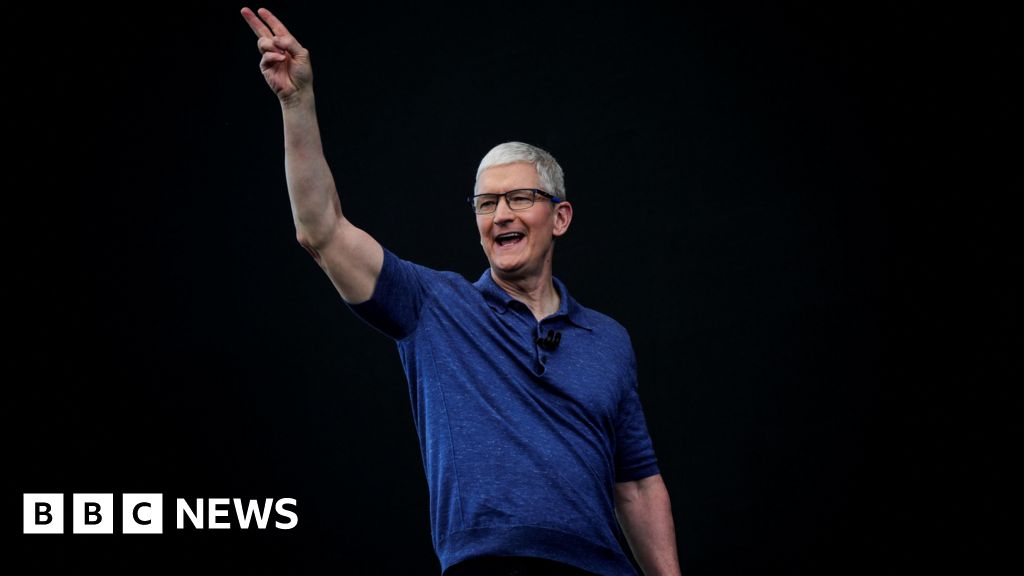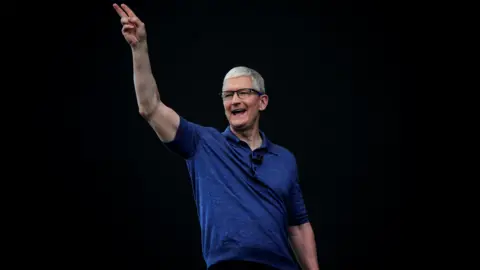
By Zoe Kleinman, Technology editor • Liv McMahon, Technology reporter
 Reuters
ReutersApple is to boost its Siri voice assistant and operating systems with ChatGPT as it seeks to catch up in the AI race.
The iPhone maker announced the Siri makeover along with a number of other new features at its annual developers show on Monday.
It is part of a new personalised AI system – called “Apple Intelligence” – that aims to offer users a way to navigate Apple devices more easily.
Updates to its iPhone and Mac operating systems will allow access to ChatGPT through a partnership with its developer, OpenAI.
ChatGPT will also used to be boost other tools, including text generation and email assistance. The test version will become available in the autumn.
Apple has faced pressure to introduce new AI features to its products after the rapid rise of rivals who have adopted the technology.
After it was usurped by Microsoft as the world’s most valuable company in January, Apple was overtaken again by Nvidia in early June.
Ben Wood, chief analyst at CCS Insight, said that while Apple’s new personal AI system “should help placate nervous investors”, its ChatGPT integration may reveal and create deeper problems for the firm.
“Arguably this sees Apple admitting its limitations given ChatGPT will kick in at a point where Siri is no longer able to help a user,” he told the BBC.
Apple has been largely absent in the avalanche of AI products released by tech firms in recent months.
Mr Cook told investors in 2023 that the company would approach the tech with care. On Monday, those plans were finally laid out.
What is ‘Apple Intelligence’?
“Apple Intelligence” is not a product nor an app in its own right.
It will become part of every app and Apple product customers use – whether it’s a writing assistant refining your message drafts or your diary being able to show you the best route to get to your next appointment.
In that sense, it is similar to Microsoft’s AI assistant Copilot – but you won’t have to pay extra to activate it.
Siri, the voice assistant Apple acquired in 2010, has been refreshed with a new interface and chattier approach to help users navigate their devices and apps more seamlessly.
Apple was keen to stress the security of Apple Intelligence during Monday’s keynote.
Some processing will be carried out on the device itself, while larger actions requiring more power will be sent to the cloud – but no data will be stored there.
Given it will require a considerable amount of personal data in order to be truly useful (a dilemma facing all AI products), this is vital to its customer base who pay top dollar for its products on the basis of its privacy promises.
What does OpenAI and Apple deal mean?
Apple’s decision to integrate OpenAI’s ChatGPT tech had been widely anticipated but it is an unusual move for a company that so closely guards its own products.
Google and Microsoft have recently faced scrutiny over errors made by their AI products in recent months, with the search giant rolling back a new feature in May after its erroneous answers went viral.
For years Apple also refused to allow its customers to download any apps outside of the App Store on the grounds that they might not be secure, and would not allow any web browser other than its own Safari for the same reason.
It only changed when forced to by EU legislation.
Is it a sign of recognition that even Apple can’t compete with ChatGPT right now?
If so, it tells us a lot about the current power of the AI supergiant OpenAI.
The firm did say it would integrate other products in future, but did not name any.

